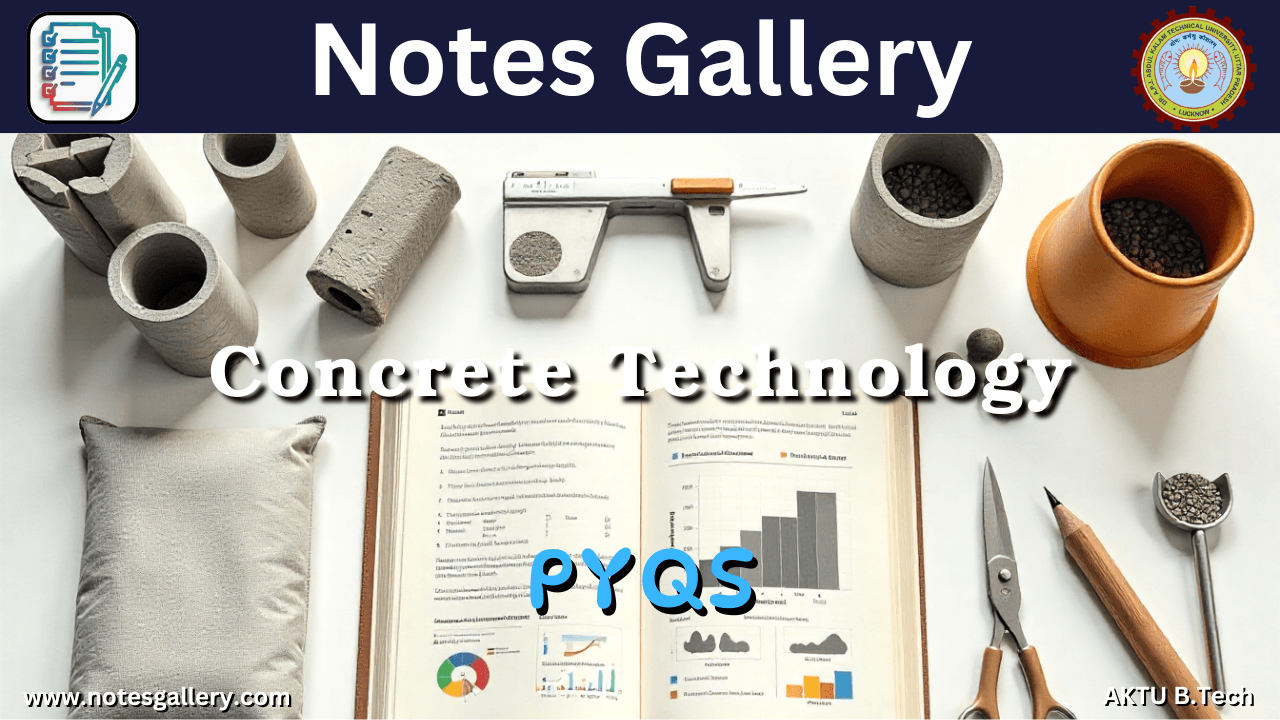Concrete Technology is one of the most essential subjects in AKTU’s Civil Engineering curriculum because it forms the foundation of all construction-related learning. Understanding the behavior, properties, and performance of concrete helps students gain clarity about real-life construction processes. This is why solving Civil 3rd Year AKTU PYQS (Concrete Technology) becomes extremely important for exam preparation. PYQs highlight the repeated pattern, important concepts, practical questions, and numerical problems that AKTU focuses on every year.
| YEAR | LINKS |
|---|---|
| 2018-19 | DOWNLOAD |
| 2019-20 | DOWNLOAD |
| 2020-21 | DOWNLOAD |
| 2021-22 | DOWNLOAD |
| 2022-23 | DOWNLOAD |
| 2023-24 | DOWNLOAD |
| 2024-25 | DOWNLOAD |
| 2025-26 | coming soon… |
Click Links given below for notes/Imp. Question/PYQs
https://notesgallery.com/aktu-b-tech-1st-year-free-study-materials/ First Year
https://notesgallery.com/aktu-b-tech-2nd-year-free-study-materials/ Second Year
https://notesgallery.com/aktu-b-tech-3rd-year-free-study-materials/ Third Year
https://notesgallery.com/aktu-b-tech-4th-year-free-study-materials/ Fourth Year
Why PYQs Matter for Concrete Technology
Concrete Technology involves theoretical concepts mixed with practical understanding and numerical calculations. Students often find it difficult to grasp topics like mix design, durability, workability, and admixtures without practicing real exam-style questions. This is where Civil 3rd Year AKTU PYQS (Concrete Technology) play a major role. PYQs help students understand how questions are framed, which topics hold the highest weightage, and what depth of explanation is expected in AKTU exams.
Since the subject is scoring and predictable, consistently reviewing PYQs boosts confidence and ensures that students don’t miss repeated topics such as slump test, curing methods, IS code mix design, and concrete strength characteristics.
Key Areas Covered in the Subject
Concrete Technology covers the entire lifecycle of concrete from material selection to testing and performance evaluation. PYQs reflect this structure, making them ideal for targeted preparation. Below are the major topics highlighted every year in Civil 3rd Year AKTU PYQS (Concrete Technology):
1. Cement and Aggregates
Questions commonly appear on the composition of cement, types of cement, properties of fine and coarse aggregates, and tests like fineness, specific gravity, impact value, and abrasion value.
2. Workability and Its Tests
Workability is repeatedly asked because it is a core concept in concrete preparation. Students must understand slump test, compaction factor test, Vee–Bee consistometer, and factors affecting workability.
3. Concrete Mix Design
AKTU often asks numerical questions based on IS 10262 guidelines. Concepts like water–cement ratio, target strength, characteristic strength, aggregate proportioning, and trial mixes frequently appear in Civil 3rd Year AKTU PYQS (Concrete Technology).
4. Strength and Durability of Concrete
Long questions often focus on compressive, tensile, and flexural strength tests, along with durability factors such as sulphate attack, chloride penetration, creep, and shrinkage.
5. Admixtures and Special Concretes
Questions also cover types of admixtures, their functions, and special concretes like lightweight concrete, fiber-reinforced concrete, high-performance concrete, and self-compacting concrete.
6. Fresh and Hardened Concrete Tests
Students are expected to explain testing procedures, apparatus, and typical values. PYQs help clarify the expected answer format and step-by-step explanation style.
How PYQs Improve Exam Preparation
Solving Civil 3rd Year AKTU PYQS (Concrete Technology) gives students a strong advantage because this subject follows a very uniform pattern. PYQs help students recognize frequently repeated questions such as:
The difference between OPC and PPC
Factors affecting durability
Curing methods
Concrete grade classification
Mix design procedure
Admixture types and effects
By practicing these questions, students can prepare 70–80% of the exam with high accuracy. Moreover, PYQs help improve theoretical answer writing, especially when explaining definitions, laboratory procedures, or conceptual differences.
Exam-Oriented Strategy for High Scoring
To score high in Concrete Technology, students should follow a targeted preparation strategy built around previous year questions. Focus more on topics that appear repeatedly in Civil 3rd Year AKTU PYQS (Concrete Technology). Prepare short notes for tests, include diagrams wherever needed, and memorize typical values like slump ranges, aggregate limits, and curing time.
Solve numerical problems from IS code-based mix design at least three times before the exam. Use PYQs to understand the level of detailing required in answers. For theory questions, write in small points with clear headings so your answer looks neat and earns maximum marks.
Students should also revise laboratory test procedures because they carry direct and indirect questions. Understanding the purpose, equipment, and steps involved in each test makes these questions very easy to score.
Why Notesgallery Is Helpful for Students
On www.notesgallery.com, Civil Engineering students get well-organized resources including important PYQs, exam-focused explanations, and chapter-wise preparation help. With the right study plan and reliable PYQs, students can score extremely well in this subject.
Conclusion
Concrete Technology is simple, predictable, and highly scoring when students rely on the right preparation approach. PYQs help students understand exam trends, important topics, and expected answer patterns. Practicing Civil 3rd Year AKTU PYQS (Concrete Technology) ensures strong conceptual clarity and boosts confidence before the exam. With consistent practice and smart revision, students can easily score above 70 marks in this subject.
